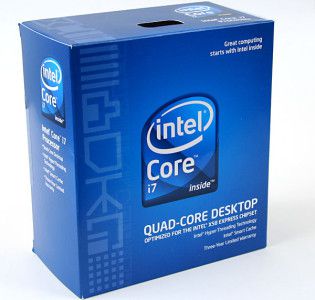From our front-page news:
When we posted our original look at Intel's Core i7 processors in early November, we managed to include performance data for all three of the launch chips in the same article. However, Intel wasn't able to provide us all three, so through a little bit of trickery, we under-clocked the i7-965 to match the clocks of the i7-940, which was actually Intel's idea.
Well, as Scott at TR discovered, both Intel and reviewers alike overlooked a few important details, and as a result, performance data does change between the simulated CPU and the real one. The problem boils down to the processor's internal clocks, and in this particular case, the Uncore Clock (UCLK) is of most interest. As it turns out, how we managed the under-clocking overlooked the UCLK entirely, which meant that it was clocked higher than it would have otherwise been on a retail chip.
In the end, the performance differences aren't that significant, but there are clear differences all-around... not to mention power consumption adjustments. Although Intel's reviewer's guide omitted the UCLK factor as well, I don't think they did it on purpose, because it's something that even reviewers didn't catch until now, and no surprise given that the UCLK is usually hidden deep within the BIOS... especially true on Intel's DX58SO.
As an added note, I'm not quite sure what we'll be doing for our own CPU reviews thanks to these new-found discoveries, but we'll figure it out shortly. I've actually been in the process of re-benchmarking our entire fleet, so I'm glad this information came right before I was to begin testing on our i7 machine.

...even with its slower L3 cache and memory controller frequencies, the system equipped with the retail Core i7-940 draws about 15W more than the one with our simulated 940 from our original review. Why? Likely because Intel sorts its chips for the various models based on their characteristics, and the Core i7-965 Extreme chips are the best ones-most able to reach higher clock speeds and to do so with less voltage.
Source: Tech Report
Well, as Scott at TR discovered, both Intel and reviewers alike overlooked a few important details, and as a result, performance data does change between the simulated CPU and the real one. The problem boils down to the processor's internal clocks, and in this particular case, the Uncore Clock (UCLK) is of most interest. As it turns out, how we managed the under-clocking overlooked the UCLK entirely, which meant that it was clocked higher than it would have otherwise been on a retail chip.
In the end, the performance differences aren't that significant, but there are clear differences all-around... not to mention power consumption adjustments. Although Intel's reviewer's guide omitted the UCLK factor as well, I don't think they did it on purpose, because it's something that even reviewers didn't catch until now, and no surprise given that the UCLK is usually hidden deep within the BIOS... especially true on Intel's DX58SO.
As an added note, I'm not quite sure what we'll be doing for our own CPU reviews thanks to these new-found discoveries, but we'll figure it out shortly. I've actually been in the process of re-benchmarking our entire fleet, so I'm glad this information came right before I was to begin testing on our i7 machine.

...even with its slower L3 cache and memory controller frequencies, the system equipped with the retail Core i7-940 draws about 15W more than the one with our simulated 940 from our original review. Why? Likely because Intel sorts its chips for the various models based on their characteristics, and the Core i7-965 Extreme chips are the best ones-most able to reach higher clock speeds and to do so with less voltage.
Source: Tech Report
